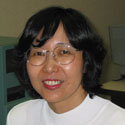Academic Editors
The following people constitute the Editorial Board of Academic Editors for PeerJ. These active academics are the Editors who seek peer reviewers, evaluate their responses, and make editorial decisions on each submission to the journal. Learn more about becoming an Editor.

Anshuman Singh
Dr. Anshuman Singh is a Senior Scientist (Horticulture) at ICAR- Central Institute for Subtropical Horticulture, Lucknow, India. His primary research interests include genetic improvement of tree fruits such as mango, guava and Indian blackberry (jamun) for higher fruit yield and quality, and tolerance to insect-pests, diseases and environmental stresses such as salinity.

Rohit Upadhyay
Dr. Rohit Upadhyay is a Research Scientist in the School of Medicine at Tulane University.
He has skills and expertise in the following areas; Cancer Genetics, Cell and Molecular biology, Kidney Injury, Pharmacology, and Molecular mechanisms of complex diseases.

Tsung-Min Hung
Tsung-Min Hung (Ernest) currently works as a research chair professor at the Department of Physical Education , National Taiwan Normal University. He was inducted as a fellow for the National Academy of Kinesiology (US) and the International Society of Sport Psychology in 2018. His research mainly focuses on two areas. The first area is about enhancing sport performance through cortical intervention. Specifically, EEG signature of superior sport performance, precision sports such as golf, shooting, archery, and service in racket sports in particular, as well as neurofeedback are his current endeavor. The second area of research focus on neurocognitive effect of physical activity. Children with ADHD, the elderly participants, and young children are his current targeting population.

Cristina Capusa
Associate Professor of Nephrology, PhD and Habilitated Doctor in Nephrology at the "Carol Davila" University of Medicine and Pharmacy in Bucharest and attending physician (consultant in Nephrology and Internal Medicine) at a university-affiliated tertiary-care hospital. Former secretary of the Romanian Society of Nephrology and currently member of the society board.
Research interest in: chronic kidney disease, renal anemia, intravenous iron therapy, mineral metabolism disorders in chronic kidney disease, oxidative stress in kidney disease and glomerular diseases.

Sharif S Aly
As a veterinary epidemiologist I specialize in dairy cattle infectious diseases and welfare. I received my veterinary medicine degree from Cairo University (1998), practiced for two years before completing the Food Animal Production Medicine Internship at the Caine Veterinary Teaching Center at the U of Idaho, followed by the Food Animal Reproduction and Herd Health Residency at U of California, Davis. I completed my masters and doctoral degrees at UC Davis in Preventive Veterinary Medicine and Epidemiology, respectively.

Stephen L Macknik
Stephen L. Macknik trained as a postdoc with Zachary Mainen at Cold Spring Harbor Laboratory, and David Hubel at Harvard Medical School. He has a BA in Psychobiology, Biology and Psychology from the Univ of California, Santa Cruz, and a PhD in Neurobiology from Harvard Univ, with Margaret Livingstone. His research seeks to understand the neural underpinnings of visual awareness and attention, and the neural consequences of cerebral blood flow in the healthy brain and in neurological disorders.

Michael G LaMontagne
Ph.D. Biology, Boston University. NATO Advanced Study Institute: Molecular Ecology of Aquatic Microbes. NASA Planetary Biology Intern at the Center for Microbial Ecology, Michigan State University, East Lansing, MI. Marine Biological Laboratory, Summer Course in Microbial Diversity, Woods Hole, MA
Research Projects include: Microbial Ecology; Plant-Microbe Interactions; Metagenomics; Microbial Discovery; Biogeochemistry.

Tokuko Haraguchi
2020 - present: Professor at Osaka University.Editorial Board of Cell Structure and Function.
1992 - 2020: Senior Researcher of Biology at National Institute of Information and Communications Technology. Professor (joint appointment) of Graduate School of Science at Osaka University. Professor (joint appointment) of Graduate School of Frontier Biosciences at Osaka University,

Amjad Abu Hasna
Dr. Amjad Abu Hasna D.D.S., MS.c, Ph.D. (Endodontist) is currently serving as an Assistant Professor of Endodontics at the Institute of Science and Technology, São Paulo State University.
His primary areas of expertise include Bioceramics, Intracanal Medication, Endodontic Irrigants, Antimicrobial Action, Cytotoxicity and Genotoxicity.

Curtis Daehler
Professor in the School of Life Sciences at the University of Hawaiʻi at Mānoa. Research interests include invasive species, plant-animal interactions, population biology, island biology, conservation and biogeography.

Ana I.F. Ribeiro-Barros
PhD in Plant Molecular Biology (1997, Wageningen University and Research);
Director of the Tropical College, University of Lisbon (ULisboa);
Head of Research Lab and Professor of Cell Biology, Biotechnology, Microbiology and Tropical Ecosystems (School of Agriculture, ULisboa);
Invited professor Universidade da Madeira (Portugal), Eduardo Mondlane University and Gorongosa National Park (Mozambique;
Area of scientific activity (25+ years): Agrobiotechnology applied to the management and characterization of agro-forestry resources: Biodiversity; Conservation Genetics; Ethnobotany; Landscape genomics; Molecular Ecology; Plant-Environment Interactions (symbioses, pathogenesis and abiotic stresses); Soil diversity.
Scientific Identifiers:
Ciência Vitae: 081F-E3CE-9D52
ORCID: 0000-0002-6071-6460
Scopus: 35557486600
Google: https://scholar.google.pt/citations?hl=en&authuser=2&user=hzAWUTUAAAAJ

Alexander Bolshoy
Dr. Bolshoy has completed his PhD from the Weizmann Institute of Science in 1993. He is the author of the book "Genome Clustering: from linguistics models to classification of genetic texts", Springer-Verlag, 2010, and many scientific articles. He is serving as an editorial member of several reputed journals like Bioinformatics and Biology Insights, Computational Biology and Chemistry, ISRN Bioinformatics; and Linguistic Frontiers.

